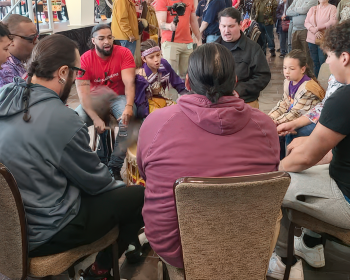Taxation on Native American reservations is an issue that has plagued tribes and courts at all levels for decades. This issue has come to a head in New York state with a US Supreme Court ruling in February 1994 on the Attea case, named for Milhem Attea and Bros. of Buffalo, NY, a licensed cigarette stamping agent and non-native. This case began in 1989 when regulations were imposed by the state government on the quantity of tax-free cigarettes that could be delivered to reservations by wholesalers. The delivery amount would be determined through negotiations with native populations and the statewide average consumption of cigarettes and gasoline. The tax on goods delivered above this negotiated amount would be the responsibility of the wholesaler, not the retailer. Attea, a cigarette wholesaler, sued the state, refusing responsibility for the state's collection of taxes and believed these regulations were pre-empted by the Federal Indian trader law. This case eventually reached the Supreme Court who ruled in favor of the state saying it had the right to limit the amount of untaxed cigarettes delivered to the reservation by wholesalers.
Among Native Americans, the issue is not whether the State can tax natives, rather, it is whether the state can force native businesses on sovereign native land to tax their non-native patrons. The amount of cigarettes and gas allowed onto reservations would reflect the approximate consumption by native residents alone and would not account for the non-native business attracted to the reservations due to their tax-exempt status. Anything above the normal consumption would be taxed. Native American tribes in New York say no.
New York Governor Pataki suggested several deadlines for implementing this ruling which also states that New York must collect taxes from non-natives on reservations. After immense pressure from the New York Association of Convenience Stores, the ruling was enforced on April 1, 1997. Reservation economies in New York slowed to a halt. In May 1997, Governor Pataki suspended the order and allowed the sale of tax-free goods on reservations, reaffirming tribal sovereignty.
Historical Opportunities on the Reservation
The main source of employment on reservations that do not enjoy the prosperity of gaming comes from the gas stations and cigarette shops that traditionally sell these products tax-free. This economic advantage helps tribes achieve self-sufficiency as sovereign nations. Most tribes are not blessed with oil reserves, or thousands of acres of timber (should they be willing to cut it down), providing a sound economic base. Most tribes, in fact, were given the poorest land or such a small parcel that any attempt at self-sufficiency would be very difficult. This difficulty was acknowledged when reservations were created.
Many reservations were created when tribes were defeated by the United States, signed peace treaties, and forced to relinquish all, but a small portion of their land. Federal policy at this time was to keep the natives segregated to enable a smoother westward expansion until the natives were "civilized." The office entrusted with the running of the reservations was called the Indian Office or Indian Agency. The natives were treated as wards of the country with the federal government as their guardian. The "office" built schools and trained native men in non-native agriculture. The primary objective of the Indian Office was to provide subsistence to the natives confined to these reservations -- the agents were to distribute food and supplies on a regular basis.
The Indian Office was one of the most corrupt agencies of the federal government. Native populations were decreasing and an Indian Peace Commission, made up of whites, was put forth to examine the problem. In 1867, they found the agents of the Indian Office had pocketed money ear-marked for native use and were thus withholding food and supplies, causing many natives to starve. The agents had also distributed spoiled food and poor quality goods and supplies. Because the natives had lost their hunting grounds, they were forced to rely on the sub-standard handouts from the agents. Although the cause pointed to fraudulence and inhumanity within the Indian Office, the Indian Peace Commission concluded that the problems with reservation life would continue to exist until "the Indians were civilized or extinct."
Reservation life has evolved into the present-day circumstance of needing to survive on them. Native Americans are finally able to subsist to some extent without government handouts by operating businesses that bring hundreds of jobs and dollars to native people who have not had many opportunities for self-sufficiency. The unique status of Native American tribes as "domestic dependent nations" with sovereignty has enabled them to build casinos, have their own government, courts, medical clinics, and police departments. It is also this unique status as tax-exempt Native Americans that creates economic opportunities on reservations for the first time. On reservations in New York, it is primarily the low cost of tax-free cigarettes and gasoline that attract outsiders. Other businesses on reservations, such as the restaurant and crafts industry, rely heavily on the gasoline and cigarette clientele who may not make the extra effort to get to the reservations if the prices were the same as elsewhere.
The Native Response
Native American leaders say that it is their inherent right as sovereign nations to be immune from the state collection of any taxes, of any kind, on reservations. R. Cook, Director of Communications for the St. Regis Mohawk Aboriginal Trade and Commerce Commission, states that the tax issue is both a political and an economic issue that borders on apartheid. He also states that New York does not take seriously the sovereignty enjoyed by Indian Nations in New York, "who does the collecting isn't the issue, trying to force another nation to collect taxes for an entity with no affiliation is the issue." On the federal level, there has been a movement to abrogate Indian treaties. The federal government wants to pass legislation that "chips away at aspects of our sovereignty" said Cook. The Senate Fiscal Year 1998 Interior Appropriations bill (H.R. 2107), seriously threatens tribal sovereign rights. Section 120 of this bill would "waive any claim of sovereign immunity for a tribe that receives tribal priority allocations from the Bureau of Indian Affairs (BIA)" and Section 118 "would require the BIA to create a formula for means testing and to collect information on tribal government income." Cook states that "sovereign rights are rights bestowed from a higher authority What we as natives have is `aboriginal inherent authority' and this is what will defeat these sovereignty-infringing bills and court cases. In the next five years there will be a return to the traditional ways of governing [versus tribal elected governments]. It is only at this level that our battle will be won."
At a rally in Albany in May 1996, hundreds of natives protested against state collection of taxes. One sign read, "According to our figures, you owe us!" This statement simplifies the feeling of the natives: land, resources, and lives have been exploited and destroyed for hundreds of years and now that natives have found a way to subsist economically, the state also wants to take that away One must look back to history to find the answer. Understanding and retribution is long overdue; the past actions toward natives have no statute of limitation. New York should not continue to perpetuate the historical oppression of natives. The proposed taxation will kill one of the only successful means of subsistence tribes have known.
Article copyright Cultural Survival, Inc.



